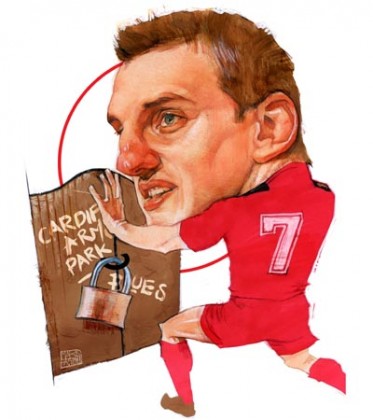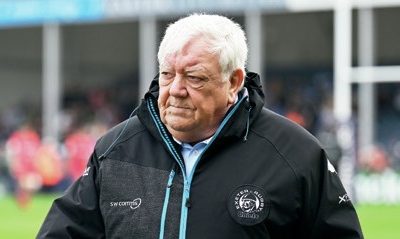
 Sam Warburton’s central contract with the WRU is threatening to become an unholy mess. When the news broke last weekend that the Wales captain had become the first player to sign a central contract with the Welsh Rugby Union, the move smacked of the Union using him to gain an advantage in their acrimonious wrangle with the four Welsh Regions.
Sam Warburton’s central contract with the WRU is threatening to become an unholy mess. When the news broke last weekend that the Wales captain had become the first player to sign a central contract with the Welsh Rugby Union, the move smacked of the Union using him to gain an advantage in their acrimonious wrangle with the four Welsh Regions.
Nothing that has happened subsequently has altered that perception – and by becoming the Union’s man it is Warburton who is stuck in the middle.
Under the terms of the deal the WRU will pay the 25-year-old openside flanker, who led the 2013 Lions to victory over Australia last summer, £300,000 a year until the end of the 2017 Lions tour. It guarantees Warburton a healthy income and also leases him back to Cardiff Blues, the region he plays for currently, free of charge. On the debit side it is c. £200,000 less than he could have earned in France, and it does not assure him of selection for Wales.
Although the WRU’s chief executive, Roger Lewis, hailed the signing of Warburton as a breakthrough, there is a much starker scenario looming. Namely, that it could lead to a complete breakdown in relations between the WRU and the Regions, and will end in the law courts.
There is a sense that the WRU have become a stalking horse for the International Rugby Board over the fundamental issue of whether national Unions have primacy over club/regional competitions as well as professional player contracts. Yet, there is no guarantee that Lewis and Roger Pickering, the WRU chairman, will get the result they and the IRB want if it goes to law.
 Lewis described Warburton’s central contract as a win-win for the Cardiff Blues as well as the WRU. However, that claim is contradicted by the Regions declaration – supported by the English clubs – that they will not play any centrally contracted players unless they have a sustainable Participation Agreement with the WRU.
Lewis described Warburton’s central contract as a win-win for the Cardiff Blues as well as the WRU. However, that claim is contradicted by the Regions declaration – supported by the English clubs – that they will not play any centrally contracted players unless they have a sustainable Participation Agreement with the WRU.
The backdrop is that when Leigh Halfpenny and Alun Wyn Jones turned down WRU central contracts last week – Halfpenny to join Toulon and Jones to remain contracted to the Ospreys – the WRU was in urgent need of a PR coup.
Warburton’s signing fitted the bill, and having thanked the Cardiff Blues chairman, Peter Thomas, Lewis said: “Welsh rugby together cannot stand back any longer and watch its best players leave… and I am sure this will be remembered as an important moment for rugby in Wales.”
Unless there is a resolution to the rift between the WRU and the Regions, in particular the signing of the Participation Agreement, it could be remembered instead as the moment when there was a disastrous schism in Welsh rugby.
The fissures are already there. The Regions did not take long to issue a statement pointing out that the WRU are closing the stable door after the thoroughbreds have bolted. With 11 of Warren Gatland‘s Wales starting line-up signed already by French or English clubs they argue that the Union have been so slow to react that the exodus of top players is done and dusted.
The Regions also accuse the WRU of an about-turn. Whereas the Union are saying now that the Regions – which are largely self-funded – can have centrally contracted players for free, previously they insisted that any WRU funding for such a contract was deducted from a Region’s existing income.
For bridges to be built the WRU will either have to support the cash-strapped Regions in joining the Rugby Champions Cup (replacing the Heineken Cup), or approve them joining an Anglo-Welsh Premiership.
Until now the WRU, who pay the Regions only £1.4m each a year for international player release, have refused to grant permission for them to participate in either competition – and that leaves Warburton in limbo.
If the Regions challenge the WRU by participating in unsanctioned competitions Warburton will be unable to play for the Blues (or any other Region) – or any English Premiership club – and therefore be starved of match-practice in preparation for the international windows.
Sadly, that crucial point does not appear to have been relayed to Warburton. He revealed in his national newspaper column that his main proviso in signing a central contract was that he could continue playing for the Blues, the team he has supported since childhood.
Equally damaging is the perception that now that the WRU has a vested interest in Warburton he will be favoured in Wales selection over any non-centrally contracted rival, such as the Ospreys openside Justin Tipuric.
It begs the question why the WRU did not opt to go into a co-operative venture with Cardiff Blues, who were offering to put up £200,000 to secure Warburton’s services, by stumping up a £100,000 to seal the deal, rather than tying him to a central contract.
That would have had the dual benefit of not only keeping Warburton in Wales, but being much less divisive. Instead, the WRU appear to have outbid one of their own Regions for a leading player – but only after 11 others have already departed.
In the process the WRU have fuelled suspicion that they are trying to turn the clock back 20 years and deliver an Irish-style model of Union-controlled Regional franchises with all the players under central contracts.
It is a powder-keg agenda.


Latest News
Super Rugby Americas: Round Ten Review

British and Irish Lions
British and Irish Lions: Biggest winners and losers from Andy Farrell’s selection
























You must be logged in to post a comment Login